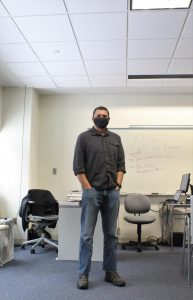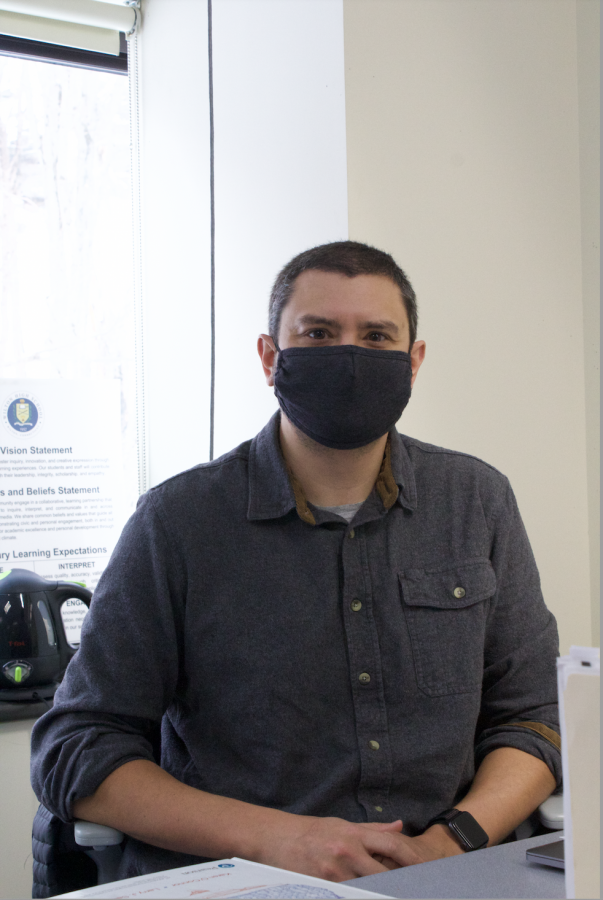Mr. Colati
Humans of WHS
Mr. Colati, a history teacher at Wilton High School, takes part in an interview in “Humans of WHS.”
Tell me a story about yourself:
“My father’s side of the family is my Italian side and my mother’s side of the family is my Japanese and British side. My grandmother had a very interesting story through WWII. Her father was Japanese and her mother was British. Both British citizens, her family lived in Shanghai, China, working for a branch of a British bank. But when WWII started, and the Japanese invaded Shanghai, my grandmother’s family was separated into the female and male prisoner of war camps. Even though they had Japanese ancestry, they were still British citizens and had to spend the duration of the war there. Eventually they were liberated by the Allied Forces. It wasn’t like a concentration camp in Germany, it wasn’t very pleasant. My grandmother ended up moving back to England, where she met my grandfather, who was a US soldier stationed there. They got married and were trying to move back to the US, but the government here wouldn’t let her in because of her Japanese ancestry and the residual racism after the Pearl Harbor attack. I don’t know how long it took, but it was quite a process. But in the end, some representatives from the state of Maine helped out, and it even took a Congressional Order signed by President Truman to allow her into the country to join her husband. My grandmother was a very kindhearted person, very unassuming. Learning about this at a young age, I was very surprised that somebody who had to go through all of that put it all behind her for a normal life. She used to live in Yarmouth, Maine, which is a little north of where I grew up. I was able to spend a lot of time with her, and only until around high school, I began to explore this rich, meaningful history.”
“Part of what I do like about history are stories. You talk about how people learn, how they adapt. When I was younger, I never did well in classes where I had to memorize things just for the sake of memorizing them. I never was good at biology, but I didn’t dislike the subject; I just wasn’t particularly good at memorizing parts of things. During college, I worked part time in Information Technology. My father was a teacher and my mother also worked in IT, so I’m sort of in between. But I didn’t feel challenged by my IT work; it started to feel like the same thing every day. By then, it was the end of college, which was a very weird time for a lot of people. There is an increasing pressure to have a very clear plan for what you’re going to do after college, and that you are working towards it with every single thing you have accomplished during your entire existence. Are you organizing yourself in a way to make sure that you’ll be able to do it? Are you on the right track? I used to tell people who asked, “what are you going to do after college?”: “I’m going to be a rockstar”, just to throw them off. They would ask, “are you in a band?”, and I would reply, “no”. And they didn’t know what to say.”

“But this was not my path, so right after graduate school my buddy and I moved to Alaska to volunteer for the National Park Service. For three months, we lived in a log cabin with no electricity or running water. We would build trails and tend to campgrounds. You really see how you change your patterns, because I didn’t check my email everyday. We would go to the ranger center every morning and they had a computer, but we wouldn’t use it all the time. We just kind of separated from that. I read a whole stack of books and brought my guitar to mess around with. Being in nature is a huge part of who I am, and even now I do a lot of hiking and camping. The other part of this escape was a rejection of the societal pressure to have a meticulously designed plan in life. After returning from Alaska, I worked in an IT job for four years before going back to grad school. To this day, I experience this dual nature of enjoying building computers and setting the technology up, but at the same time, some of that romanticized view of transcendentalism.”
“A story like that of my grandmother’s was engaging and made me want to try to understand it more. When I was in high school, I interviewed my grandmother for a school project. I think my biggest takeaway from it was admiration for my grandmother. She went through so much and then lived a very pleasant, happy, and normal life. She didn’t seem scarred by what happened, and certainly never took it out on anyone – she was such a nice person! I suppose that probably shaped me as it did my mother in trying to be calm, understanding, and to avoid holding grudges. My grandmother’s brother wrote a book about their experiences before he died, titled “I Remember One Time…”. It details their family’s life before and after WWII: life before the Japanese invasion, life while imprisoned during the war, and decisions they had to make about where they would live after the war. I haven’t read it all yet, but talking about it now has reignited my interest in getting my own copy and finishing it. I would like to think that we are all on personal journeys to improve ourselves, to maybe even attain self-actualization, to put it in psychological and philosophical terms; investigating personal history can certainly be a part of that. I think even if your personal history is painful, facing that might help you better understand yourself, your family, and your relationships with friends and family. I certainly am not a family historian, there is a lot I don’t know. I don’t feel a particular draw to any of the nationalities of my ancestors, but their story is a part of mine in some way. If we are trying to improve ourselves, knowing our story seems important.”
Joy Ren is a senior at Wilton High School. This year, she is so excited to fulfill the role as Editor-in-Chief of The Forum. Socially conscious and seeking a variety of experiences, she loves to write about her community under the Humans of WHS column. In her free time, nothing is more perfect than working on the Saturday crossword with a steaming mug of tea.

